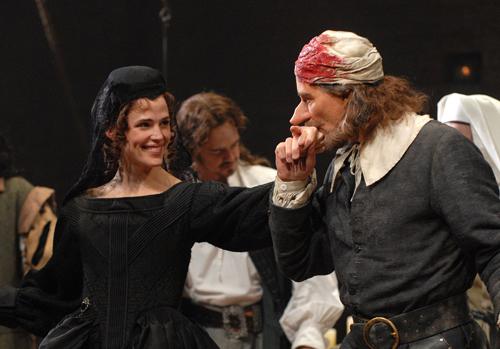David Leveaux, director of latest ‘Cyrano’ revival, aspires to live with protagonist’s panache

Actors Jennifer Garner and Kevin Kline at the curtain call for the opening night of “Cyrano De Bergerac” on Broadway at The Richard Rodgers Theatre, Thursday in New York. Peter Kramer, The Associated Press
November 2, 2007
NEW YORK – David Leveaux was living in East Germany just before the fall of the Berlin Wall when he saw an image that would stay with him nearly two decades later: A boy of about 7 was dancing on a coffin covered in the words, “R.I.P. Staasi,” a reference to the communist country’s soon-to-be obsolete secret police.
Leveaux, director of Broadway’s revival of “Cyrano de Bergerac,” said the image epitomized two of the qualities that drew him to Edmond Rostand’s romantic hero – rebellion and a drive to find art in real life.
Led by Kevin Kline as Cyrano and Jennifer Garner as Roxane, the play twists from comedy to tragedy, with flashes of swordplay, wordplay and the long-nosed protagonist’s beloved panache.
Leveaux took Cyrano’s antiauthoritarianism and artful life as his inspiration in guiding the production.
“I think both Kevin and I felt the chief reason for putting this on was because it would be great to put on a piece that’s about glamour, it’s about romance, it’s about love, it’s about life – even though it has its sadness,” Leveaux said.
Get The Daily Illini in your inbox!
“Especially in a time when we’re surrounded by images of the opposite. It just seemed like a great mischievous, reckless thing to do,” added Leveaux, who has also helmed Broadway revivals of “The Real Thing,” “Fiddler on the Roof,” “Jumpers” and “The Glass Menagerie.”
In one crucial fight scene early in the play, Cyrano blends poetry and rebellion with cool elegance, gleefully dispatching a pompous bully even as he composes a poem about the man’s physical, intellectual and sartorial failings.
The director’s own sense of fun shone through in a recent interview at the Richard Rodgers Theater, where the play officially opened Nov. 1.
Standing outside the theater on a drizzly day, he looked conspiratorial as he leaned against a wall talking with Chris Sarandon, who plays the Comte de Guiche, the closest character “Cyrano” has to a villain. (In a sign of the play’s fundamental generosity, he wins over the audience by the end.)
Next to Sarandon, who has a neatly trimmed, almost aristocratic beard for the play, Leveaux looks relaxed, his long hair falling unfussily over his face.
An easy demeanor adds to the sense that he’s at least a decade younger than his 49 years, and so do his easy jumps in conversation.
A question about how closely the play hews to Anthony Burgess’ translation (there are cuts for length, and that’s all) leads into a rumination on why the play so appeals to adolescents (because everyone feels as physically awkward as Cyrano at that age) and finally into talk of his own youth in the English Midlands, where he took school field trips to see Shakespeare’s plays performed in Stratford-upon-Avon.
The transition from thinking about “Cyrano” to making it happen came about as easily, he says.
He was talking to Kline in July about the actor’s dream roles, and they decided to speed ahead when they learned the theater would be available this year for a 10-week run.
“This man is absolutely born to play this role, and we should do it,” Leveaux said. “It was timing, really.”
He lucked out again, he said, when Garner signed on to play Roxane. At time, the character can seem like a dilettante, just a pretty face, someone hardly worthy of the poetry and heroism Cyrano offers. But Garner reminds audiences that her character’s love for words rivals Cyrano’s – and that her sword skills may equal his as well. She is, after all, the star of movie’s “Elektra” and TV’s “Alias.”
After Garner jokingly asked Leveaux for a fight scene, he acquiesced by having her tidily intercede in the midst of a key duel.
“I knew that Jen had scale,” he said.
Filling the last of the three crucial roles is Daniel Sunjata as Christian, who draws Roxane’s attention with his physical beauty but nearly loses it with his unimaginative speech. His plea to Cyrano to put words in his mouth sets the play’s tortured love story in motion.
To Sunjata, the play isn’t just about resisting authority, but also the restrictions people place on themselves.
“I think (Cyrano’s) greatest disdain is reserved for the tyranny of the temporal self in all its many manifestations; cowardice, pride, stupidity, uselessness,” Sunjata said by e-mail. “To me, it’s a play about the symbiant relationship and the universal dialogue between the open heart and the frightened mind.”
Though Leveaux has also tried acting – “My greatest contribution to the British theater was giving it up,” he says – he soon settled into directing. He staged his first Broadway play, “A Moon for the Misbegotten,” in 1984, and later moved to East Berlin.
In the city, in the last days of the Cold War, he experienced firsthand the societal repression Cyrano feels as he fends off hundreds of enemies. Leveaux remembers realizing that a writer friend was cooperating with the Staasi, and that one of the government censors had an almost uncanny gift for spotting potentially rebellious symbols and metaphors.
In the weeks before the Berlin Wall came down, he said, everyone lived like an artist – expressing themselves freely in their daily lives the way they never had before.
He hopes that “Cyrano” might encourage people to do the same.






